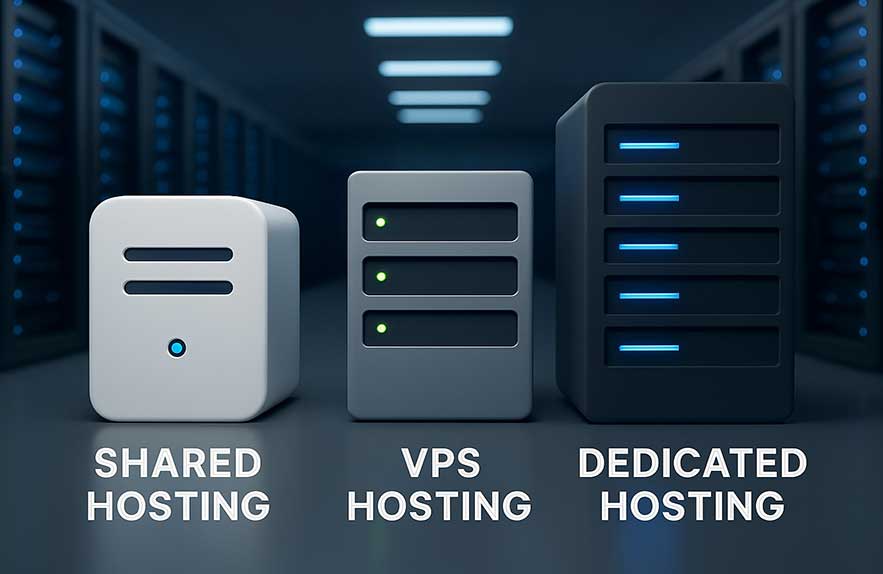
Introduction: What Is Web Hosting and Why Does It Matter?
When I first dipped my toes into building a website, “what is web hosting?” was honestly the first thing I googled. It sounded technical and a bit overwhelming. Maybe you feel the same way — like everyone assumes you already know what web hosting means, when in reality, it’s not as mysterious as it seems. You might be starting a blog, putting your business online, or finally working on that portfolio you’ve been planning. Whatever your project, understanding the real web hosting meaning is the foundation for getting your site out there for the world to see.
In basic terms, web hosting is like paying rent for a spot to keep your website’s files and make them available around the clock. Imagine you’ve made an amazing new painting — you could hang it at home where only you and your cat can see it, or you could rent a gallery space where anyone can come admire it whenever they want. With websites, your “gallery” is the server your web host provides. Web hosting for beginners doesn’t have to feel complicated — it’s just about picking a reliable space for your project to live online, accessible to anyone who types in your site address.
So, why does it matter? Without hosting, everything you create online stays private — like notes in a locked drawer. But when you understand how web hosting works, you unlock the power to connect, share your work, and even grow a business. That’s why every serious website, from tiny personal blogs to big company homepages, relies on a trustworthy host. In 2025 especially, as digital life gets busier, it’s important to know your options and avoid falling for overpriced or underpowered plans that overpromise to beginners.
I wrote this guide because I remember how confusing it seemed at first. You’ll come across all sorts of words: “shared,” “VPS,” “cloud” — the types of web hosting can sound like a foreign language, but choosing the right one isn’t as tough as it looks. If you’re searching for web hosting for beginners, you’re already on the right path. In the next sections, we’ll break down all the basics, bust some myths, and explain how different hosting types really compare in plain English.
By the end of this article, you’ll know exactly what web hosting means, understand the difference between the main types of web hosting, and have the tools you need to make a smart choice as a newcomer. So whether your goal is a simple landing page or an ambitious blog, let’s start at square one: making sense of web hosting so you can confidently launch your first (or next) site. Ready? Let’s get into what web hosting really is and how it all fits together.
Table of Contents
- Introduction: What Is Web Hosting and Why Does It Matter?
- Understanding the Web Hosting Meaning: A Simple Explanation for Beginners
- How Does Web Hosting Work? Making Sense of the Tech Behind Your Website
- Types of Web Hosting Explained: Choosing the Right Home for Your Website
- What Kind of Hosting Do You Need? Finding the Best Fit For Your Website
- Final Thoughts & Getting Started with Web Hosting
Understanding the Web Hosting Meaning: A Simple Explanation for Beginners
What exactly does “web hosting” mean? If you’ve ever tried to research how to launch a website, you’ve probably run into a lot of buzzwords and half-explained concepts. Let’s make it simple. At its core, the web hosting meaning comes down to this: it’s a service that lets you store all the stuff that makes up your website—text, images, code, and even your customer’s comments—on a special kind of computer called a server. That server is always connected to the internet, so anyone in the world can type in your website’s address and see what you’ve built, day or night.
Another way to think about it is comparing your website to a shop in a busy downtown. The shop’s address (your website’s domain name) points people to the right place, but the web hosting itself is the actual building where all your products sit. If you try to run your website without hosting, it’s like putting up a sign for a shop that doesn’t exist—people can find the address, but there’s nothing there when they arrive. That’s why understanding what is web hosting and why it matters is so important right from the start.
For beginners, some of the key pieces of web hosting to know include: servers, bandwidth, and uptime. The server is the rented space or storage where your files and data live. Bandwidth is like the size of a road outside your shop—the more visitors, the wider it needs to be, or else it gets jammed up. Uptime is how often your site is online and available—look for hosts that promise (and deliver) 99.9% uptime or better, because you don’t want your site randomly disappearing when someone needs it.
Some people wonder if web hosting for beginners should be different than what bigger businesses use. Honestly, the basic principles don’t change much. Everyone needs their site to be fast, available, and secure. What does change is the scale—big businesses need more power and support, while bloggers, freelancers, or small shops can start with simpler (and more affordable) plans. Most good providers make it easy to upgrade as your site grows, so you’re not locked into what you picked on day one.
Whether you’re launching a personal project or a business venture, knowing the real web hosting meaning helps you avoid rookie mistakes and saves you money down the line. Next up, we’ll get under the hood and answer one of the most common beginner questions: how does web hosting work? We’ll break down what happens step-by-step when someone types in your address, so you’ll understand exactly how your future site will greet its visitors.
How Does Web Hosting Work? Making Sense of the Tech Behind Your Website
If you’re new to all this, you might be thinking, “Okay, I get the web hosting meaning—but how does web hosting actually work?” You’re not alone! Even people who’ve been online for years often have no idea what’s really happening when they visit a website or upload files to their host. The reality is fairly straightforward when you skip the jargon and break it down step by step.
Every time someone types your website address into their browser, a little chain reaction starts. First, they’re asking the internet, “Where can I find this website?” That’s where your domain name system (or DNS, for short) kicks in. Think of DNS as an ultra-fast phone book; it looks up your domain and points the visitor to the server where your site is hosted. In a sense, web hosting is like a digital storefront—people need the right address, but they also need a physical shop (the server) to visit.
Once the visitor arrives, your web hosting provider’s server gets to work. The server pulls up all the files that make up your website—like images, text, and code—and quickly sends them across the internet straight into the visitor’s browser. If everything goes smoothly, this process takes less than a second, even if your visitor is halfway around the world. To keep things running smoothly, hosts also take care of the techy stuff you’d rather not deal with, like network speed, security patches, and making sure your site stays online (a big perk for web hosting for beginners who just want things to work).
For most beginners, it helps to remember this: there’s not just one kind of web hosting. When someone asks, “what is web hosting” or wants to know how does web hosting work, the answer can look a little different depending on the type of plan you pick. Shared hosting means your site shares resources with other sites on the same server; it’s affordable, but best for smaller projects. VPS (virtual private server) hosting offers more power and privacy. Dedicated hosting gives you an entire server all to yourself—great for big ecommerce stores or really busy blogs. Cloud hosting and managed WordPress hosting have their own perks, which we’ll break down in the next section.
Here’s what matters: reliable web hosting makes your site accessible to the world, fast, and (ideally) secure—without you having to babysit servers or learn complicated networking. Understanding how web hosting works puts you ahead of most first-time website owners, and sets the stage for smarter choices as you grow your project. Next, we’ll walk through the main types of web hosting and help you figure out which one fits your goals and your budget.
Types of Web Hosting Explained: Choosing the Right Home for Your Website
If you’re new to the world of building websites, it’s easy to get overwhelmed by all the choices. Suddenly, you’re faced with terms like shared hosting, VPS, dedicated servers, and even cloud or WordPress hosting. What do these types of web hosting mean, and how do you know which one is right for you? Let’s break them down in beginner-friendly language so you can see the differences—and which might be the best starting point for your project.
If you’d like to dig even deeper or see more technical explanations, the Wikipedia entry on web hosting services is a great unbiased resource. It covers all the main categories of hosting, breaking down everything from basic definitions to advanced configurations, perfect for anyone who wants that extra layer of detail.
Shared Hosting
Think of shared hosting as renting an apartment in a big building. You have your own space for your website, but you’re sharing resources like water and electricity (in this case, server CPU and bandwidth) with many neighbors. It’s the most affordable web hosting for beginners and works great for blogs, personal sites, or small business pages that don’t expect big spikes in traffic. The trade-off is that if another “tenant” gets busy, your site might slow down a little. But for most people starting out, shared hosting is a friendly and cost-effective introduction to what web hosting can offer.
VPS Hosting (Virtual Private Server)
VPS hosting is more like owning a condo. You still share the building, but your space—and your resources—are set aside just for you. This type of web hosting offers more control, better security, and greater customization, so it’s ideal if you want to run more complex sites, online stores, or even small business applications. It’s more expensive than shared hosting but still affordable as you grow.
Dedicated Hosting
If your site needs maximum power or you’re running a big project, dedicated hosting gives you an entire house (server) to yourself. No neighbors, no sharing—just pure performance and complete control. While it’s much pricier, some businesses and high-traffic websites need this for speed, security, and reliability. For most web hosting for beginners, it’s overkill, but it’s good to know it’s there as an option down the road.
Cloud Hosting
Cloud hosting is like using several apartments across a city, all linked together. You’re not tied to one building—if your site suddenly gets popular, it can “move” and borrow more rooms instantly. This hosting option offers great flexibility and can handle sudden growth or heavy traffic without missing a beat. It’s a great choice for modern businesses, apps, and anyone who expects to grow fast or have visitors from around the world.
WordPress Hosting
If you’re running your site on WordPress (which powers a huge chunk of the web), some hosts offer plans designed just for this platform. WordPress hosting is tuned for speed, security, and super-easy updates—perfect for beginners who want less technical hassle and more time focusing on content. Many pros started with simple WordPress hosting before moving on to larger or more custom setups.
Understanding the types of web hosting out there helps you avoid wasting money on resources you won’t use—or struggling with a plan that’s too simple for your needs. Up next, we’ll walk through real-world scenarios to help you pick the best option for your website, whether it’s a personal blog, a busy store, or something completely new. If you’re still asking yourself which web hosting for beginners is right for you, don’t worry—we’ve got you covered in the next section!
What Kind of Hosting Do You Need? Finding the Best Fit For Your Website
So, you know the web hosting meaning, how it all works, and the different options out there. But the big question remains: What kind of hosting should you actually choose for your website? The truth is, there’s no one right answer for everyone—the best choice completely depends on what you’re building. Here’s a rundown for beginners on how to match your project with the types of web hosting you’ll find out there.
Personal Blogs & Small Portfolios If you’re starting a blog or a basic website to showcase your work, shared hosting is usually the smartest place to begin. It’s budget-friendly, easy to set up, and takes care of most of the heavy lifting behind the scenes. As a beginner, you don’t need much tech knowledge—just sign up, install WordPress or another CMS, and you’re ready to share your ideas with the world.
Ecommerce & Online Shops Running an online shop can quickly outgrow basic shared hosting. For ecommerce sites, look for web hosting with a bit more power, like VPS or managed WordPress hosting. These options give you better performance, more security controls, and the reliability customers expect when shopping online. If you want to scale up as you grow, cloud hosting is another excellent pick, since you can increase server resources without missing a beat.
Growing Businesses & Busy Agencies If you’re managing multiple client sites, high-traffic business pages, or agency portfolios, dedicated servers or robust VPS hosting may be worth the investment. These types of web hosting provide complete control and the best speeds, so your sites aren’t slowed down by neighbors on shared plans. Cloud hosting is also great for businesses that need flexible resources or remote collaboration tools.
Side Projects, Learning, and Experimentation Just experimenting or learning the ropes? Most web hosting for beginners plans allow multiple sites or “add-on domains” so you can try out ideas risk-free. Look for a host with good documentation, a simple dashboard, and responsive support—those things matter more than raw power at the start.
And remember, there’s no rule saying you have to stick with the first host you pick. As your site grows or your needs change, it’s common to move up to a different plan or even switch providers altogether. The most important thing is to start somewhere reliable. If you’re still unsure what is web hosting best suited for your needs, check out our hosting reviews and comparisons for hands-on breakdowns and the latest recommendations tailored for every kind of website.
In the end, understanding the range of types of web hosting lets you pick with confidence, knowing your site will be secure, speedy, and easy to manage—no matter where your online journey takes you next.
Final Thoughts & Getting Started with Web Hosting
If you’ve made it this far, you’re already ahead of most beginners. Understanding what is web hosting, the different types available, and how the process works puts you in the perfect spot to launch your own site with confidence. Starting out online can feel intimidating, but just about every website you’ve ever visited got its start the same way: by choosing a web host and taking that first leap.
My biggest advice for anyone new to web hosting is not to let the choices hold you back. You don’t need to commit to a single provider for life, and it’s totally normal to start with a basic plan (like shared hosting) and upgrade as your project grows. Remember, the goal is to pick a reliable home for your site that fits your needs right now—don’t get distracted by endless options and features if you just want to get online and start sharing your ideas or products with the world.
If you want an extra hand picking a provider, check out our detailed web hosting reviews and comparisons for 2025. We break down the most beginner-friendly hosts, budget options, and what to watch for as you look around. It’s the quickest way to get up to speed and avoid common traps that trip up first-timers.
Whether you’re building a simple portfolio, launching a store, or testing out new ideas, you’re already on the right path. The world of web hosting for beginners is full of opportunities, and you don’t have to be a tech expert to succeed—you just need the right guide and a little bit of curiosity.
So what’s next? Pick a reputable web host, start with a plan you can afford, and keep this guide handy for when you run into your next question. Happy building—and welcome to the world of websites!

